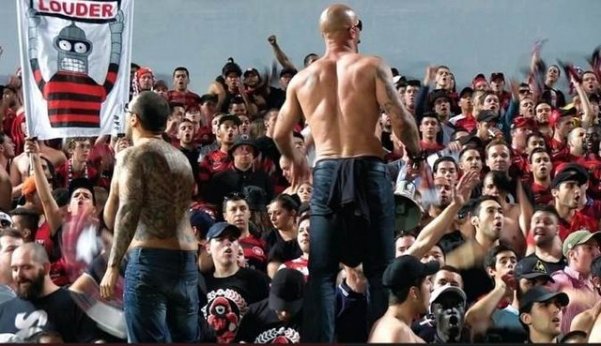 What can we as individuals do if we don’t accept the torrent of vitriol, racial abuse and false information currently swirling around us? Quite a lot, really, if we are prepared to be steadfast, patient and respectful. Artists and arts activists in western Sydney have been travelling this path for many years. Through their art forms they have offered insights into what it’s like to belong to one or several different cultures and how that may find individual expression through their personal experience. As artists reveal aspects of their lives, we witness vulnerability, a search for the infinite, for meaning and understanding. Insights may challenge assumptions about each other and leave audiences and participants more open to new ideas and understandings.
What can we as individuals do if we don’t accept the torrent of vitriol, racial abuse and false information currently swirling around us? Quite a lot, really, if we are prepared to be steadfast, patient and respectful. Artists and arts activists in western Sydney have been travelling this path for many years. Through their art forms they have offered insights into what it’s like to belong to one or several different cultures and how that may find individual expression through their personal experience. As artists reveal aspects of their lives, we witness vulnerability, a search for the infinite, for meaning and understanding. Insights may challenge assumptions about each other and leave audiences and participants more open to new ideas and understandings.
Khaled Sabsabi is a western Sydney artist, who was awarded the inaugural Western Sydney Arts Fellowship in 2016. He migrated from Lebanon with his parents as a 12 year old in 1978 as a result of civil war, and settled in western Sydney. His personal experiences of conflict and dislocation in Lebanon and then in his adopted homeland of Australia, led him into deep social engagement. Independent curator and editor of Artist Profile, Kon Gouriotis wrote in 2014, “As a young artist, Sabsabi began experimenting with sound and poetry within the hip‐hop group COD (Count on Damage) in Granville NSW. He gradually moved to sound tracks for short and feature films, his last work was for Cedar Boys (2009). Yet it was to be media that eventually connected his sound and images . . .”
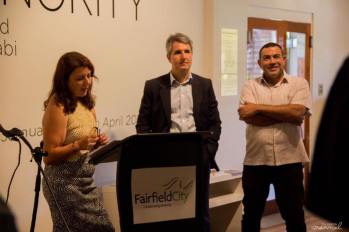 Fairfield City Museum and Gallery is currently hosting a solo exhibition of Khaled’s work, Majority/Minority, which Kon officially opened in January. It encompasses three works which reflect on the complexities of migrant experience in western Sydney and the way in which minorities have gradually become the majority in areas like Fairfield. Kon, centre above, with gallery coordinator Carmel Aiello and Khaled Sabsadi. Top, is a still from Khaled’s two channel video Wonderland (2014), one of the three works in Majority/Minority.
Fairfield City Museum and Gallery is currently hosting a solo exhibition of Khaled’s work, Majority/Minority, which Kon officially opened in January. It encompasses three works which reflect on the complexities of migrant experience in western Sydney and the way in which minorities have gradually become the majority in areas like Fairfield. Kon, centre above, with gallery coordinator Carmel Aiello and Khaled Sabsadi. Top, is a still from Khaled’s two channel video Wonderland (2014), one of the three works in Majority/Minority.
In 2003 Khaled returned to Lebanon for the first time. He was profoundly affected by his exposure to the origins of his Islamic Sufi lineage. Kon considers that some of the Sufi teachings would have resonated deeply with Khaled, “especially an individual’s right to imagine the infinite”. It is generally understood that Sufism predates Islam and was connected to Zoroastrianism. Khaled uses the online name of peacefender and has worked extensively in detention centres, schools, prisons, refugeee and settlement camps. Among many awards, Khaled is a recipient of the Blake Art Prize, Helen Lempriere Travelling Art Scholarship and an Australia Council for the Arts Community Cultural Development Fellowship.
In the last year alone he has participated in group exhibitions in Yinchuan City, China; Blacktown Arts Centre, NSW; Artspace, New Zealand; and at Bait Al Shamsi, Sharjah, UAE. Next Saturday, February 25, from 1pm to 3pm, Kon will be in conversation with Khaled at Fairfield Museum and Gallery. They will discuss Khaled’s exhibition Majority/Minority and some of his recent practice and reflect on the broader role of the arts and cultural sector in western Sydney. You are invited to attend and to participate with questions and discussion. RSVP to museumgallery@fairfieldcity.nsw.gov.au or call 9725 0190 by Thursday 23 February. Complimentary refreshments will be provided.
You don’t have to look far in western Sydney for other examples of thought provoking work by artists of sometimes demonised minorities. Within Arms Reach was the poignant and haunting work, right, created by Jason Wing for The Native Institute, a 2013 exhibition at Blacktown Arts Centre. Jason is an artist of Aboriginal and Chinese descent, who was evoking the anguish of Aboriginal parents who camped outside the 19th century institute fence in the hope of catching a glimpse of their captive children.
to look far in western Sydney for other examples of thought provoking work by artists of sometimes demonised minorities. Within Arms Reach was the poignant and haunting work, right, created by Jason Wing for The Native Institute, a 2013 exhibition at Blacktown Arts Centre. Jason is an artist of Aboriginal and Chinese descent, who was evoking the anguish of Aboriginal parents who camped outside the 19th century institute fence in the hope of catching a glimpse of their captive children.
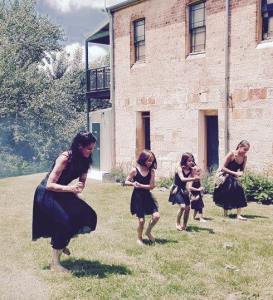 Wagana Aboriginal Dancers from Katoomba, under the leadership of Wiradjuri descendant Jo Clancy, continue to explore traditional culture and create contemporary dance works. They are developing cultural knowledge and confidence among their young members and sharing their understanding with local and international audiences. Here they are at their first performance for 2017 at Woodford Academy, managed by the National Trust. Later this year, they will perform at the World Indigenous People’s Conference in Toronto, Canada.
Wagana Aboriginal Dancers from Katoomba, under the leadership of Wiradjuri descendant Jo Clancy, continue to explore traditional culture and create contemporary dance works. They are developing cultural knowledge and confidence among their young members and sharing their understanding with local and international audiences. Here they are at their first performance for 2017 at Woodford Academy, managed by the National Trust. Later this year, they will perform at the World Indigenous People’s Conference in Toronto, Canada.
The politically-charged marriage equality debate is the subject of a new dance performance at Riverside Theatres, Parramatta. In Difference is a production of Form Dance Projects and Riverside in which leading dance artist Craig Bary 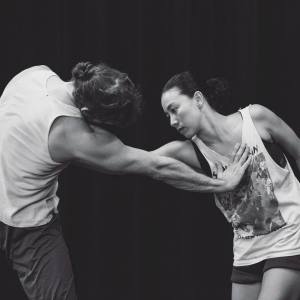 has drawn together a gifted artistic team. Here they are working on ideas and choreography, right, in preparation for a brief season, March 2 to 4, at 8pm.
has drawn together a gifted artistic team. Here they are working on ideas and choreography, right, in preparation for a brief season, March 2 to 4, at 8pm.
“Marriage equality is a real issue for real people so we are making this work for them, and hope to make a significant contribution to the debate in the most creative and inspiring way,’ says Bary. ‘We will also bring the real life of the performers on stage to create a compelling, vulnerable and open environment for the audiences to connect with.”
We all have a need of connectedness, of belonging. Is there really any difference between the needs of a same sex couple and a heterosexual couple? In Difference promises a penetrating and poignant demonstration that dance can communicate important issues and make a social and political impact.
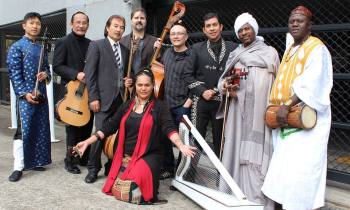 Other examples of work that defy the stereotypes and demonstrate the riches that come with experience of individual stories abound in western Sydney. Sydney Sacred Music Festival, now in its seventh year, is under the direction of musician Richard Petkovic. Over time, he has gradually assembled a whole range of highly trained musicians from many cultural and religious backgrounds, who are also frequently refugees. Their explorations of contemporary expressions of ancient traditions is continuous, where they share the transformative power of the sacred as distinct from the potential divisiveness of the religious.
Other examples of work that defy the stereotypes and demonstrate the riches that come with experience of individual stories abound in western Sydney. Sydney Sacred Music Festival, now in its seventh year, is under the direction of musician Richard Petkovic. Over time, he has gradually assembled a whole range of highly trained musicians from many cultural and religious backgrounds, who are also frequently refugees. Their explorations of contemporary expressions of ancient traditions is continuous, where they share the transformative power of the sacred as distinct from the potential divisiveness of the religious.
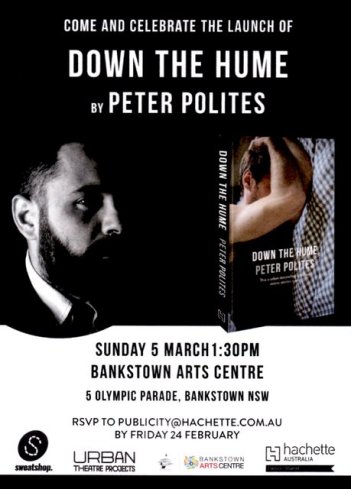 Western Sydney Literacy Movement – Sweatshop based at Western Sydney University, will launch associate director Peter Polites’ first novel, on March 5. Down the Hume is queer-ethnic Western Sydney noir, the first of its kind, and is published by Hachette, one of the biggest publishing companies in Australia.
Western Sydney Literacy Movement – Sweatshop based at Western Sydney University, will launch associate director Peter Polites’ first novel, on March 5. Down the Hume is queer-ethnic Western Sydney noir, the first of its kind, and is published by Hachette, one of the biggest publishing companies in Australia.
Check out Natalie Wadwell’s latest blog post where she reflects on Resilience, it’s a cultural thing and promotes Jon Hawkes’ argument that culture should be the fourth pillar of sustainability. He proposed in 2001 that culture is not an additional policy or a strategy, but a framework through which we assess social, environmental and economic strategies. Natalie links this to her recent experience of a Resilient Sydney workshop.
National Theatre of Parramatta is just one more of many fine examples of companies that seek to defy stereotypes by presenting stories from diverse cultural communities. Still only in its second year, it has already met with great success.














 result is his first book of fiction published earlier this year by Giramondo. Its style is gentler.
result is his first book of fiction published earlier this year by Giramondo. Its style is gentler.